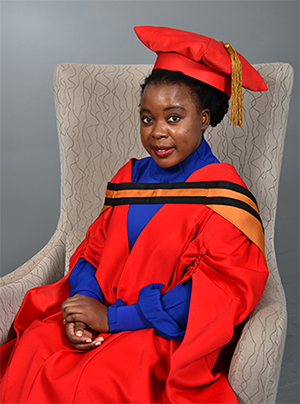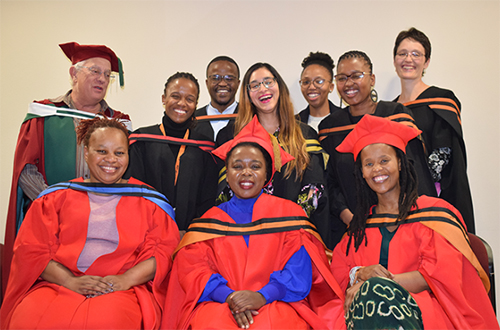
The African college of excellence in the social and human sciences

Dr Fortunate Silinda (Lecturer in the Department of Psychology, College of Human Sciences)
According to Unisa Fast Facts 2019, the university produced 350 doctoral graduates in 2018. One of those candidates was Dr Fortunate Silinda, a registered research psychologist and lecturer in the Department of Psychology housed within the College of Human Sciences.
Silinda said her research interests were ignited by her involvement as a peer helper and assistant student counsellor at Unisa. She began her career in these roles at Unisa’s Directorate: Counselling and Career Development (DCCD), where a number of students approach the offices to seek personal counselling, academic and career guidance. It was not long before she left the directorate to take up a research internship position at Unisa’s Bureau of Market Research (BMR). The experiences she encountered during the consultation sessions with the students made her realise the need to understand students’ experiences at university so she could recommend interventions through research.
In 2012, Silinda enrolled for a Master’s degree in Psychology, where she investigated the stress experienced by postgraduate students while writing dissertations and theses. The findings of this project were that a number of challenges experienced by students when writing dissertations and theses are in line with being a first-generation student and the lack of support from the university, supervisors and members of family.
She pointed out that in a country like South Africa, the majority of first generation students are from historically disadvantaged backgrounds with a consistent unfortunate experience of challenges such as uncertainty, lack of support from family members, lack of financial support and poor time management. The findings of this study led to her journal publications in the South African Journal of Psychology and the International Journal of E-Learning & Distance Education, 2016.
Enrolling for her PhD in Psychology in 2014, Silinda’s research focused on how a number of social and psychological factors influence the desires of undergraduates to finish their degrees. One of her findings is that academic persistence is related more to students’ identification with their academic departments than their identification with the university as a whole. The study makes an important contribution to the discussion on transformation in that it highlights the need to address specific department-level factors, such as curriculum, and not only broad university-level factors, such as symbols and statues.
She said her experience as a lecturer encouraged her to plough back into the society by empowering high school learners through her work at Winning Youth Foundation, which aims to build on the strengths and abilities of alumni from rural areas so that they find hope and success in life.
Silinda is currently engaged in a project that seeks to establish an understanding of master’s and doctoral students’ experiences during their postgraduate journey. She believes it is of utmost importance to improve and enhance their academic persistence in their programmes. She added that the identification of the psychosocial factors impacting on postgraduate students’ academic persistence will provide universities with an informed knowledge and an advanced understanding of students’ immediate and long-term needs in order to be successful in their academic journey.

Dr Fortunate Silinda (front, centre) with colleagues from the Department of Psychology
"Postgraduate students are expected to perform and to complete their programmes in the required time. Moreover, students are expected to adjust to the university life and fit to the academic culture as well as feel a sense of belonging in the university. In the same vein, universities are also expected to have high graduation and retention rates and produce graduates of high quality."
Through this project, Silinda is hopeful that they may highlight where students are in need of more assistance and where students might benefit from additional training when writing dissertations and theses in a distance-learning environment. She said the project will also help improve South Africa's competitiveness in the global market by making recommendations on the required high-level human capital to be developed, trained, and sustained in order to reduce high dropout rates of postgraduate students. The findings of the project will also be important in other university contexts, since Silinda and her team are collaborating with the Liverpool John Moores University.
* Compiled by Katlego Pilane, Assistant Communication and Marketing Specialist, College of Human Sciences
Publish date: 2019-05-03 00:00:00.0